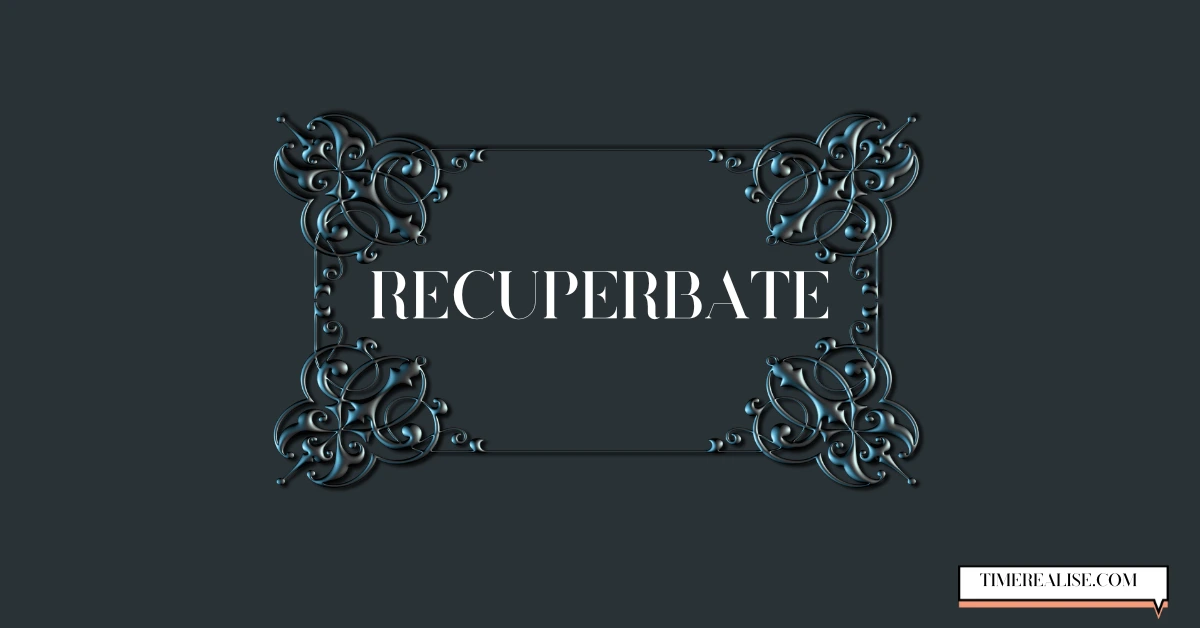Recuperbate for a Stronger You: A Holistic Approach to Recovery
Recuperbate is all about getting your energy back—both for your body and your mind. It involves making small but important choices that help you rest, recharge, and feel balanced. This goes beyond just relaxing; it means developing habits that include gentle exercises, healthy eating, and caring for your mental health. By doing these things, you can avoid feeling tired or stressed and stay strong for everything life throws your way.
What is Recuperbate?
The term ‘recuperbate’ denotes a comprehensive approach to recovery and wellness, emphasizing restoring physical and mental health. Originating from the fusion of ‘recuperate’ and ‘debate’, recuperbate encapsulates the intricate dialogues surrounding healing processes in contemporary health frameworks. This innovative term has gained traction in discussions among health professionals, wellness advocates, and individuals seeking to improve their overall quality of life.
The Physical Pillars of Recuperbate
Rest and Sleep
Rest is non-negotiable when it comes to Recuperbate. Quality sleep allows the body to repair itself, restore energy, and maintain optimal functioning. Incorporating restful activities like napping or low-intensity stretching can complement sleep to aid physical recuperation.
Nutrition and Hydration
Fueling your body with the right nutrients is a cornerstone of Recuperbate. A balanced diet rich in vitamins, minerals, and antioxidants accelerates recovery, while proper hydration supports vital functions like muscle repair and toxin removal.
Active Recovery
Recuperbate doesn’t mean complete inactivity. Engaging in light physical activities like walking, yoga, or swimming can enhance blood flow, reduce soreness, and promote flexibility, ensuring the body stays agile while recovering.
Key Components of Recuperbate
Physical Recovery
- Restoring Bodily Functions: Involves traditional medical treatments, rehabilitation, nutrition, and exercise to regain physical health.
- Prevention-Oriented Strategies: Encourages proactive measures, such as routine health screenings, balanced diets, and physical activity, to minimize future health risks.
- Integration of Alternative Therapies: Includes practices like acupuncture, yoga, massage therapy, and chiropractic care to complement conventional medicine.
Mental and Emotional Recovery
- Mental Health Care: Focuses on addressing stress, anxiety, depression, and other psychological challenges through therapy, mindfulness, and counseling.
- Emotional Well-Being: Encourages practices like journaling, meditation, and creative outlets to foster self-expression and emotional clarity.
- Stress Management: Teaches coping mechanisms, such as deep breathing exercises and time management, to build resilience against life’s pressures.
Dialogue and Community Support
- Open Communication: Promotes discussions between patients, healthcare providers, and support networks to create a shared understanding of recovery needs.
- Peer Support: Encourages joining groups or forums where individuals can exchange experiences and advice.
- Family Involvement: Recognizes the importance of family and loved ones in offering emotional and logistical support during recovery.
Read More: lucas black net worth
The Benefits of Using Recuperbate

Recuperbate offers a range of benefits that can significantly improve mental clarity. One of the most notable advantages is enhanced focus and concentration. Users often report being able to stay on task longer, making it easier to complete projects and manage daily responsibilities. This increased focus can lead to better productivity, enabling individuals to achieve more in less time. In addition to improved focus, Recuperbate has been linked to enhanced memory retention. Studies suggest that certain ingredients in Recuperbate may help support memory formation and recall, making it an excellent option for students and professionals alike. Users often find it easier to remember important information and experiences, which can be beneficial for learning and working environments.
Mental Recovery in Recuperbate
Mindfulness Practices
In the hustle of daily life, mental exhaustion often goes unnoticed. Recuperbate encourages mindfulness through meditation, deep breathing, or grounding exercises, helping to calm the mind and refocus energy.
Journaling and Reflection
Writing down thoughts, emotions, and goals is an effective Recuperbate tool. Journaling provides clarity, organizes mental clutter, and fosters personal insight, paving the way for mental renewal.
Visualization Techniques
Recuperbate also involves envisioning success and positive outcomes. Visualization not only boosts confidence but also reduces stress by mentally preparing you for challenges ahead.
Applications of Recuperbate
Healthcare Settings
- Integrative Medicine: Blends conventional treatments with complementary practices such as meditation, nutrition counseling, and alternative therapies.
- Patient-Centered Care: Focuses on shared decision-making, where patients work alongside healthcare providers to determine the best course of action.
- Chronic Illness Management: Incorporates recuperbate principles to help individuals cope with long-term conditions like diabetes, arthritis, and heart disease.
Personal Wellness Practices
- Self-Care Routines: Encourages individuals to adopt habits like regular exercise, proper hydration, and adequate sleep.
- Mindfulness and Relaxation: Integrates activities like yoga, tai chi, or guided meditation to reduce stress and promote mental clarity.
- Creative Expression: Advocates for hobbies like painting, writing, or music to enhance emotional well-being.
Community and Workplace Programs
- Workplace Wellness Initiatives: Companies can adopt recuperbate principles to reduce employee stress, increase productivity, and foster a healthier work environment.
- Support Groups: Community-based programs can create safe spaces for individuals to share and learn from each other’s recovery journeys.
- Workshops and Education: Offers training on mental health awareness, stress management, and balanced living.
Incorporating Recuperbate Into Daily Life
Recuperbate is not a one-size-fits-all approach. It’s a dynamic framework you can adapt to your unique lifestyle and needs. Start small by dedicating a few minutes each day to practices like stretching, journaling, or mindfulness. As you become attuned to your body and mind’s needs, expand your efforts to include more comprehensive Recuperbate routines.
The Importance of Social Connections in Recuperbate
Spending time with friends and family is an essential part of recuperbate. Social connections provide emotional support and help reduce stress. Whether it’s a casual chat or a fun activity with loved ones, social interactions can lift your mood and make recovery easier. Strong relationships are a key part of emotional well-being. Having people around you who care can make it easier to cope with stress and challenges. Even something as simple as spending time with friends can help you feel more relaxed and supported.
Why Recuperbate Matters Today?
In our fast-paced world, neglecting recovery is all too common. Recuperbate stands as a reminder that self-care is essential, not optional. By prioritizing methods that restore balance, energy, and focus, you can unlock your full potential. At Mating Press, we encourage everyone to explore Recuperbate, not just as a recovery tool but as a lifestyle shift toward better health and well-being.
FAQs
What is Recuperbate?
Recuperbate is a holistic approach to recovery that focuses on physical, mental, and emotional well-being, combining rest, nutrition, and mindfulness practices for overall health improvement.
How can I incorporate Recuperbate into my daily life?
Start by dedicating a few minutes each day to practices like stretching, journaling, or mindfulness. Gradually expand your routine based on your personal needs.
Can Recuperbate improve focus and memory?
Yes, Recuperbate has been linked to enhanced focus and memory retention, making it beneficial for students and professionals seeking better productivity.
Is Recuperbate just for physical recovery?
No, Recuperbate also includes mental and emotional recovery through mindfulness, stress management, and creative expression, fostering overall well-being.
What role do social connections play in Recuperbate?
Spending time with loved ones is crucial for emotional support, helping reduce stress and promoting relaxation during recovery.
In Short
Recuperbate is a comprehensive approach to restoring balance, energy, and focus by prioritizing physical, mental, and emotional health. By incorporating simple practices like rest, nutrition, mindfulness, and social connections, you can enhance well-being and unlock your full potential.
Stay Connected: Timerealise.com






